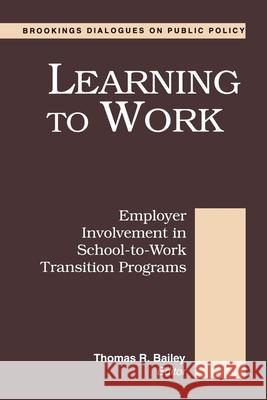Learning to Work: Employer Involvement in School-To-Work Transition Programs » książka
Learning to Work: Employer Involvement in School-To-Work Transition Programs
ISBN-13: 9780815707738 / Angielski / Miękka / 1995 / 120 str.
With job prospects clouded for even the well-educated, those who leave school with no training beyond high school now face great challenges in making the transition from school to work. Emerging research and experience in other countries have led many to believe that the workplace can play a much larger educational role than it now does. The School-to-Work Opportunity Act of 1994, for example, requires programs funded under the act to include educationally guided work placements as part of the educational strategy. Although there is a growing consensus that employers have much to contribute, significant barriers stand in the way of increasing work-based education.
This volume, the result of a Brookings conference on employer participation in education, focuses on such questions as: How can an adequate number of employers be recruited? How can the quality of placements be guaranteed? How can discrimination and inequities in providing access to good placements be avoided? What must educators do to work effectively with employers to develop high quality on-the-job educational experiences? And what policies can encourage participation and monitor and improve the education that takes place on the job?
The book includes the perspectives of employers, educators, and policymakers and draws lessons from experience with employer involvement in Europe. It concludes with suggestions for future research and policy designed to increase the quality and quantity of work-based education.
Chapters were written by editor Thomas Bailey, as well as Paul Osterman, Massachusetts Institute of Technology; David Stern, Organization for Economic Cooperation and Development; and Margaret Vickers, Technical Education Research Centers. Comments are included by George Chambliss, Xavier Del Buono, Harry Featherstone, Jack Jennings, Governor John R. McKernan, Jr., Stuart Rosenfeld, Anthony Sarmiento, Bernd Sohngen, Marc S. Tucker, Cheryl Fields Tyler, Peter van den Dool, Joan Wills, and Robert Yurasits. Brookings Dialogues on Public Policy











